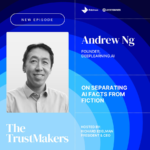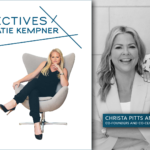A Q&A with Charlotte Kure Juul, Executive Vice President, Chief Human Resources Officer, Adform
By R. Larsson, Advertising Week
Alongside being a mother of four, Charlotte is Executive Vice President and Chief Human Resources Officer at Adform, the global advertising platform that claimed the 92nd spot out of 850 companies in the Financial Times’ third annual Diversity Leaders list.
Charlotte has spent the last ten years in executive leadership roles, where she has assumed responsibility for global communication strategies and led organisational success for her teams. Charlotte would be keen to discuss (but not limited to):
We sat down with Charlotte to discuss her own journey to the C-suite.
Q: Can you share a brief background of your career and what led you into your current role? Are there any significant moments that made an impact on you?
My current role at Adform is Executive Vice President, Chief Human Resources Officer. Having spent the last decade in executive leadership positions within the tech industry and over twenty years in HR and business development, my various roles have involved assuming responsibility for global HR strategies and training academies for customers.
I spent the first few years of my career building experience as a specialist in several HR areas. After running a huge organizational change project in 2006, it struck me I would achieve a lot more if I could get others to contribute too, and I was excited to motivate and lead a team to accomplish the best results possible. Alongside my professional life, I am also a mother of four.
Q: What do you see as the biggest barriers for women reaching senior positions in the workplace? Can you share examples of how you overcame them?
Anyone looking for success at C-suite level, whether you are a woman or not, needs to have someone else who believes in and supports them. For me, this is my husband.
If the stereotypes are true, and women are expected to take on the domestic work and stay at home when the kids are ill, it’s extremely difficult to put in the extra effort it takes to succeed at a senior level. I have also witnessed situations where some men can feel threatened by having a spouse with a more successful career.
I strongly feel you do not have to sacrifice being a good mother in exchange for a career. It just takes a mature spouse who takes an equal part of the load and is willing to help out when important deadlines or travel require your attention. Then you can do the same for them the week after. You may also need to accept that you may not live up to the perfect “super mum” standards you originally thought were possible.
For me, the essential aspect has been ensuring that the kids get a lot of love – they’ll be fine having takeaway food a few times a week!
Q: Can you suggest some steps that business leaders should be implementing to create a genuinely inclusive and representative workplace? How did you help Adform achieve its ranking in the Financial Times’ Diversity index?
True inclusion starts with the company’s values, as well as the values of those in the senior leadership team. At Adform, you get promoted based on your performance, your personal capabilities and how you fit the role. We use standardized external tools in the assessment process and have a committee making the decisions based on all the input gathered on the candidates. When people see this, they start feeling that everyone in the organization has a fair chance of following their dreams.
As an industry, we also need to help specific groups that continue to be overlooked — for example, women in tech.
Q: Are there any myths you would like to dispel about leaders in the C-suite?
People tend to forget that we are normal people with dreams, fears, challenges, successes, and failures. We are just like everyone else, and this is where a company culture of openness, collaboration and support is so important to help break down any perceived barriers.
Q: On a more personal level, is there anything you wish you had known before taking on a C-Suite role?
You cannot be friends with everyone. One of my traits as a young woman was getting upset if people disliked me — so I tried not to state any opinions. However, you must start accepting that when you have an opinion, some will like it and others won’t: that’s just life. You need a special drive and robustness to be an executive. You will face challenges, roadblocks and difficult people along the way, but you can learn from every experience. When I hire executives, I look for a few things: a fast-paced mindset, decency and courage. But above all, willingness to learn would be the most important.
Q: Have you been able to use your success to make a positive impact in the industry?
I try to be an inspiration to other women and help them out wherever I can. I encourage women to aim for their dreams. I also ensure that Adform thinks not only of diversity in terms of our current employees, by providing equal opportunity for all, but also in finding ways of tackling structural obstacles, such as the of lack of women and general diversity issues in adtech.











